
..........................................................................................................................................................................................................
il campionissimo
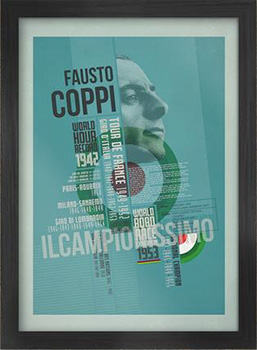
italy is currently in lockdown and experiencing the covid-19 pandemic to a far worse degree than even that experienced by china. to consider any form of competitive cycle racing in the country at present would be several hundred levels greater than just plain stupid. speaking with italian-based author, herbie sykes on saturday, he said "...in essence I've three bits of advice: stay in, stay in and stay in." it's really no surprise, therefore, that the 2020 running of milan-sanremo did not take place. i had hoped for a late entry and figured i had a good chance of victory.
now, we'll never know.
digital ingenuity, however, entailed that a verisimilitude of the race took place, comprising competitors equipped with a smart home trainer and a garmin edge gps unit. more than 4000 signed up for the event; logistically that would have made it very hard to socially distance, had that number of riders been present on the parcours between milan and san remo. notables on the virtual start list included last year's ronde van vlaanderen winner, alberto bettiol, 2018 msr victor, vincenzo nibali, filippo pozzato and maurizio fondriest. even ivan basso and italian national coach, davide cassani were 'gie'n it laldy (to employ the glaswegian vernacular) in their basements.

though all the above named would probably find the usual sub-300km route to be comfortably within their grasp, the majority of club riders would probably have expired long before the virtual finish line hoved into view. thankfully, the garmin digital edition featured only the 57km between alassio and san remo, but included the poggio and cipressa climbs. the virtual event was created in conjunction with race organisers, rcs, allowing thousands of italian riders legally required to adhere to the national decree, to ride without venturing out of doors.
however, in the heyday of milan san remo, the winners list included not only il campionissimo, fausto coppi (1946, 1948, 1949), but that of allegedly his arch-rival, gino bartali, who topped coppi's palmares by emerging as victor in 1939, 1940, and again in 1947 and 1950. arguably, had the race not been suspended in 1944 and '45 due to world war two, either of those gentlemen could, conceivably, have added to their respective trophy cabinets.

in celebration of two of italy's finest racing cyclists from the 1940s and '50s, the remarkably fine folks at the northern line have produced two exemplary posters, in the style of the bauhaus or constructivists, featuring coppi and bartali. sizes available include both a3 or a2, depending on the size of walls in your house, clubroom or man/woman cave, framed or unframed. cost of the smaller of the two, unframed, is £21, framed £38. a2 arrives at £29 unframed, or £59 with a black or white bordered frame.
with only a virtual race having taken place this year, the posters are a timely and aesthetically pleasing reminder of arguably the finest period of italian cycling.
monday 23 march 2020
 ..........................................................................................................................................................................................................
..........................................................................................................................................................................................................stay right where you are

i find myself, along with many of the island's residents, on the horns of a dilemma. after years and years of promoting the joys to be gained from visiting the hebrides in search of cycling nirvana, at the moment, i'd really rather you didn't. and i say this with the very best of intentions and include each and every island off the west coast of scotland.
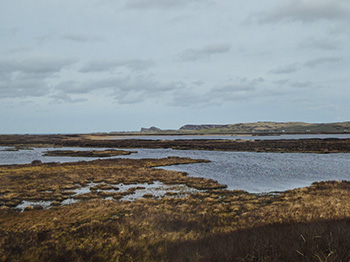
islay has a notional population of around 3,100 residents, on which the local services are based. thus, the averagemarket in bowmore main street usually carries sufficient quantities of food and drink to keep our appetites and thirsts quenched. similarly the medical, fire and police are numbered accordingly to cater, on average, to the illnesses, incidents and (very low) criminality that is expected in a fairly close-knit community. under the current restrictions due to the covid-19 pandemic, all nine distilleries have closed their doors to visitors; there are no distillery shops open and there are no tours on offer. french-owned, bruichladdich distillery, has stopped production for at least two-weeks.

in line with recent government recommendations, all cafés and restaurants have now closed to public access, though takeaways are still available. in the light of all this, i really have to query why on earth anyone in their right mind would decide to visit the islands, even if as a result of an earlier booking. calmac ferries are no longer accepting bookings (though they will honour existing reservations), so current ferry travel is on a first come, first served basis. nor are they serving any hot food on board any of their boats.
just prior to sitting down to write this article, the local grapevine advised the arrival of two camper-vans off the afternoon ferry.
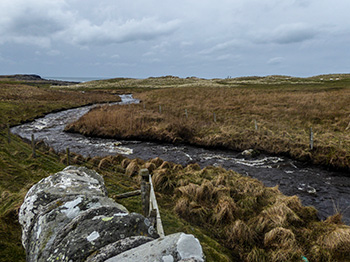
while there is no actual lockdown, i intend to take the opportunity to go cycling, on my own, as often as possible, something i did this morning and yesterday too, but i can assure you, i was well wrapped up, for the notional temperature is a mere five degrees, with a strong windchill lowering that just above zero. can you see the picture i'm trying to paint here? not only is it somewhat brisk for even a walk along one of the many beaches, there's currently nothing to do that makes any sense for anyone to travel for.
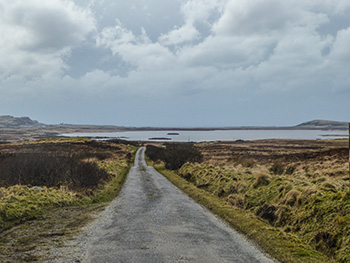
and while there are no confirmed cases of covid-19 on the island, we'd really rather keep it that way for as long as humanly possible. one excellent way of so doing, would be for those who live on the mainland, to remain there for the foreseeable future. as i mentioned above, we can just about cope with regular medical needs; a pandemic such as the world is currently experiencing, would easily overwhelm those resources in a very short space of time. they are designed to cater for the local population, and very definitely not for those who have knowingly taken it upon themselves to travel here for something as superficial (in the current circumstances) as a 'wee holiday'.
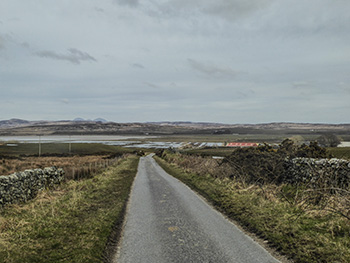
i'm generally of the opinion that those of you who regularly read these black and yellow pixels, are sensible enough to agree with and heed what i'm saying. even though the weather is a long way from hot and sunny, those of us enamoured of the spring classics, or happy to cycle-tour in all weathers, quite probably find the prospect of a bike ride in the hebrides (outer or inner), the very thing of which dreams are made. but just like the cancelled racing season, it'll probably be back again next year, eager to welcome the resilient cycle fan.
and just like the sporting milieu, islay will also still be here next year, most likely with nine, or even ten distilleries, willing to welcome you all with open arms, providing an excellent excuse (as if one were needed) to ride the length and breadth of the island. and those of us in the velo club will also be delighted to have you join the sunday ride.
but for the time being, please stay away.
the photos accompanying this monologue were taken during saturday's cold perambulation of lochs gorm and gruinart on islay's western coast. gratuitous scenery for those who are happy to visit by proxy. print one of them out and stick it on the handlebars while you're on the turbo.
sunday 22 march 2020
 ..........................................................................................................................................................................................................
..........................................................................................................................................................................................................secret trainer

i can recall robert millar (as was), stating that, once a rider passed the age of 30, training efforts had almost to be doubled in order to remain at the pre-30 fitness level. the implication here was that, should the ageing cyclist wish to add to their palmares prior to retirement, training would become a far more onerous venture. there are no end of training manuals available from bookshops all around the world that will conceivably assist in this respect, though doubtless the professionals will have access to a well-trained phalanx of coaches, more than capable of tailoring a personal programme.
i've rarely been one eager to undertake a training schedule of any kind, predominantly on the basis that my uncompetitive gene could scarcely care less. if i'm totally honest, the last time i could be seen in full-training mode, was early 2007, having elected to join sven thiele's hot chillee peloton on its way from london to paris. this event splits riders into (currently) five pelotons, based mostly on the average speed you figure is sustainable between the two cities.
i opted to join the second slowest group, not entirely based on my straight-line speed, but more concerned about my handling skills in the midst of a close-riding peloton. rare are the days on islay that a group ride exceeds six in number; dropping in at the deep-end with another 89 cyclists promised to be as much of a challenge as maintaining a 25kph average up hill and down dale on both sides of the channel. unfortunately, the former aspect is one that can only really be practiced with far more than five individuals, a very scarce commodity in the hebrides, excepting the annual ride of the falling rain. the fact that the latter takes place in august, and londres-paris in june, was a mismatch that could hardly be mitigated.
since those days, i have certainly reviewed one or two training manuals, subjecting myself to at least a chapter's worth of modest exercise, designed to improve either my terminal velocity in the sunday ride sprint, or perhaps the speed of post-effort recovery. i'd love to relate that i am a better man as a result, but a straw poll of my cycling compatriots would tend to suggest otherwise. but all that might be about to change, purely on the basis that it might catch my compatriots unawares.
it has often been said that it's well-nigh impossible to legislate for stupid, and unfortunately, it appears that members of the cycling fraternity are intent on proving that particular maxim. currently, france is in lockdown, with cycling only undertaken as a necessary means of travel. to prove the latter, cyclists must carry a certificate entitling them to be legally on two wheels. in city and urban areas, that's a curtailment relatively easy to police. rural areas, however, offer a great deal more in the way of wide-open spaces, generally populated by fewer police officers than in central locations.
cycling without official permission is punishable by a fine.
not unsurprisingly, there have been rural-based cyclists, who see no wrongdoing in nipping out for a bike ride on their own, possibly from the point of view that it's really no different than housebound isolation. however, it would serve them far better if they switched off any automated uploads to strava. consequently, riders suspected of flouting french law have been tracked by the police via their strava uploads and issued with fines on their strava pages.
while the uk, at least, still allows for solo cycling, it has occurred to me that i could secretly increase either the length, or intensity, of my weekend bike rides. indulging in the sniggeringly named fartlek, climbing repetitions, spinning, crunching big gears; anything and everything that might make me more like an unpronounceable belgian than ever. additionally, only yesterday i panic-bought a jar of crunchy peanut butter to augment my protein intake, while a plate of fresh pasta with pesto sauce can surely be considered as carbo-loading?
once this restrictive period is over and done with, as eventually it surely will be, and the sunday ride agglomerates at debbie's once again, i will be able to startle those who had written me off as an old has-been. i will impressively thunder upwards on foreland hill, stream ahead in the finish-line sprint, and easily be the first to the leather sofa in the coffee shop, post-ride
however, i'm still waiting to hear about tokyo. no point in training if i don't have to.
saturday 21 march 2020
 ..........................................................................................................................................................................................................
..........................................................................................................................................................................................................the fettling season cometh

i believe that i may have made mention of the eye-wateringly expensive twelve-speed, campagnolo super-record chain purchased months ago to replace the dragged-through-the-mud original that has offered sterling service since last year's festive 500. i can perhaps place all in some sort of perspective if i mention that it took more than just five minutes to remember where i left it.
my particular version of chain obsessive compulsive disorder will hardly allow me to affix a new chain to the ritchey, employing my even more expensive, campagnolo chain tool, without first subjecting the twelve rear sprockets to a thorough scrubbing. and not content with shiny teeth, it was also necessary to blitz the chainrings and derailleur jockey wheels. thus, while fitting a new chain takes a mere five minutes, my way of doing things added a further fifty-five.
i can think of few velocipedinists who do not admire the lustre of a shiny new chain, nor, indeed, the comforting purr of that selfsame chain through the jockey wheels, clearly audible in the throes of a tailwind. in the opposite direction, it's not possible to hear anything at all. this particular realisation fostered thoughts of just how marvellous would sound a bicycle that had been earnestly fettled to within an inch of its life.
further to yesterday's article regarding the possibilities of both indoor and outdoor perambulating on two wheels, in view of the current clampdowns on non-essential travel, which, in some cases might conceivably harsh your bicycle buzz, this may be the ideal opportunity to fettle uncontrollably. in fact, assuming that you have made it this far into the 2020 season without so much as throwing an oily rag in the general direction of the bicycle, there's little doubt that a lengthy fettling session is long overdue.
as advertised, particularly on the roads kept only for special occasions, islay's road surfaces are particulary unkempt. i do not consider this to be a special arrangement - the road network across the uk is probably every bit as bad - but the iniquity of the situation entails that i conscientiously check the tyre treads and sidewalls for nicks and cuts, before and after (well, not immediately after) each bike ride. i'm sure this may be common practice for the majority, as indeed is the practice of ensuring there's sufficient pressure in each prior to heading into the great unknown.
however, the wrong time to discover that your brakes are scarily ineffective, is when hurtling down the singletrack hill at foreland in the face of a very large tractor heading in the opposite direction. the ritchey currently sports a pair of campagnolo bora carbon rims, slowed by vicenza's red, proprietary brake shoes. though i have found them to be more than effective in the face of adversity, there's little doubt that rubber on carbon is a tad less frictional than rubber on alloy, particularly in the wet.
if you too have joined the carbon wheel club, for whatever reason, check the wear guides on front and rear pads; if they've disappeared altogether, now would be a good time to replace them. i would, however, advise that this procedure is done before the wear guides vanish forever. if the brakes are squealing, now would also be a good time to check the alignment. if you're more of a trendsetter/follower of fashion than a luddite, and feature discs instead of calipers, pad replacement is a tad more faff inducing, but no less necessary. especially if the rotors appear to be scoring and/or squealing when well past the period of shiny newness.
given the amount of rain that has infested the country in recent times, assuming this has not put paid to your cycling efforts, i'd suggest checking the gear and brake cables (if on calipers rather than discs). that goes every bit as much for those with internal cable routing; it's pretty easy to see any problems on external, uncovered cables, but you just never know what's going on behind closed carbon. i'd dearly love to be able to offer chapter and verse on electric gear systems, but aside from still considering them to be a solution looking for a problem, i am scarcely qualified to suggest any pragmatic means of fettling those.
unless you're a qualified electronics technician, i'd be inclined to leave that to the bike shop.
it's likely that more than just a few of us will have a great deal of time on our hands in the coming months, quite possibly without an income to match, making it the ideal time to learn as much about your bicycle as you can. there are many, many online resources to help you in this quest for knowledge and economy. for even if you feel ill-equipped to undertake any fettling of your own, or are without expensive tools such as the aforementioned campagnolo chain tool, when you drop the bicycle off at the bike shop, when asked what needs done, you can offer a more intellectual appraisal than "it's making a noise."
in any case, no matter whether you are the king of bicycle diy, or more comfortable with favouring the bike shop option, clean the darned thing first. your bike shop will love you and it will greatly ease spotting any potential problems for either them or you.
hopefully this is a situation we will never experience again.
friday 20 march 2020
 ..........................................................................................................................................................................................................
..........................................................................................................................................................................................................a pelotonic reduction
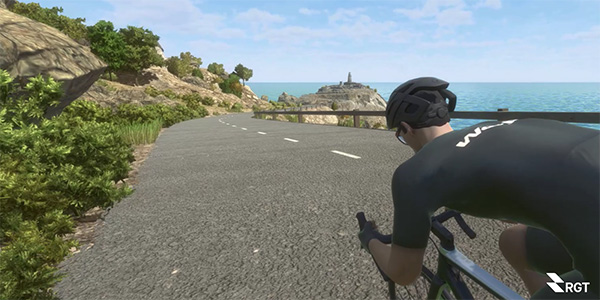
unfortunately, i have previously quoted myself as stating, if you removed the distilleries from islay, we'd have st. kilda. the latter is a sizeable rock in the north atlantic, around 70km north-west of the outer hebrides. its population was never greater than 180 at any given time, and what remained of the indigenous community was evacuated to the scottish mainland in 1930 due to widespread illness that made the community's viability untenable.
though my comment was meant as an exaggerated comparison, there's little doubt that the thousands of annual visitors intent on experiencing everything that the island's current selection of nine distilleries has to offer, provides a substantial part of islay's annual income. my contention was that, remove all of this, and we might, just might, find ourselves in a similar state of desolate isolation as on st. kilda.
unfortunately, for the unforeseeable future, that time has come to pass. laphroaig and bowmore distilleries, both owned by beam suntory, were the first to close their shops and visitor centres, but following a meeting amongst all the island's distillers on monday past, all nine have unilaterally closed their doors to visitors, including the cafés and restaurants at ardbeg and ardnahoe. this, augmented by government advice concerning the current covid-19 pandemic, pretty much signed the cancellation of this year's fèis ìle / islay whisky festival due to have taken place at the end of may.
i believe the speyside distilleries have taken similar decisions regarding closure to visitors and the two distilleries on the isle of arran are likely to follow suit on friday of this week. generally, they all intend to continue production of single-malt, though bruichladdich have announced they will cease production operations altogether on friday for at least two weeks. the island's accommodation providers have already felt the negative economic results of this unfortunate situation, and it doesn't exactly fill any of us with glee, given that we all know someone whose livelihood is dependent on the tourist trade. pretty much every employee on islay is likely to feel the pinch sometime soon, self-included.
however, government advice, at the time of writing, has stopped short of telling all and sundry to remain indoors, unlike many european countries. granted, we should all ensure that we keep a respectable distance from others in order to minimise or remove any chance of transmitting the coronavirus. it seems a tad unweildy to consider that we all might harbour the virus in the first place, but it doesn't seem to be stretching credibility too far to consider the possibility that we could; we just don't know it yet.
yet, the suggested restrictions alluded to above, do not altogether obviate the needs of those of us with an overwhelming hankering to exercise. there will be many who have already resorted to the indoor trainer, either in front of a telly box displaying moving images of watopia, or with ears squeezed between a set of noise-cancelling headphones.
the spirit of altruism in these troubled times has already been witnessed by the likes of mcdonalds and pret a manger offering nhs employees free drinks and reductions on food costs. happily, the cycling world has not remained entirely free of such altruism. if you are one of those reluctantly forced onto an indoor trainer, bereft of zwift subscription and not economically willing to join, rgt cycling, one of the latest to join the world of virtual cycling simulation, has decided to offer all of its premium features free to all indoor cyclists in response to the covid-19 pandemic.
rgt founder, alex serban said, "I really hope that this initiative sets a precedent for others to join our #rideitout movement. We are already in discussions with many of our friends and partners in the cycling industry to encourage and enable them to do more to help the global cycling community at this time".
but there are still many of us domiciled in areas relatively free from the iniquities of urban and inner-city motor traffic, with (relatively) wide-open spaces to be perambulated on two wheels. according to advice from cycling uk, provided you're able to undertake a bike ride without coming into close contact with others, it's still ok to get out and about. i cannot deny that, even prior to the pandemic, my saturday rides were notable for the remarkably few folks i saw en-route. those i have encountered are always in cars or tractors and i rarely, if ever, meet another cyclist.
whether or not you continue to drop in at the coffee shop, is perhaps a state of affairs best managed between you and the proprietor, but it might actually be better to take enough food and drink on the bike and your rear pockets to last for the length of the ride. cycling uk's advice states, "Visits to cafes and pubs should be avoided to limit exposure to infection. You should carry tissues to use when cycling, disposing of them safely in a bin as soon as possible. If you do visit a food outlet, you must wash your hands before and after visiting, and again on returning home."
these are decidedly icky-times, which may conceivably never be the same again, compounded by the fact that we've no earthly idea when it might all end, and life returns to a semblance of normal. cycle racing may have ended for the present, sportives are likely to be seriously affected (we've not begun to look at this year's ride of the falling rain, but it's likely we'll have to sooner, rather than later), but one of the joys of cycling is that it's every bit as much fun as a solo activity as it is in a group; sometimes more so.
look after yourselves, but don't forget about the bike.
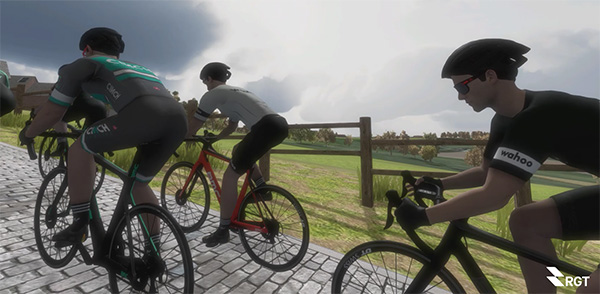
thursday 19 march 2020
 ..........................................................................................................................................................................................................
..........................................................................................................................................................................................................these are the days
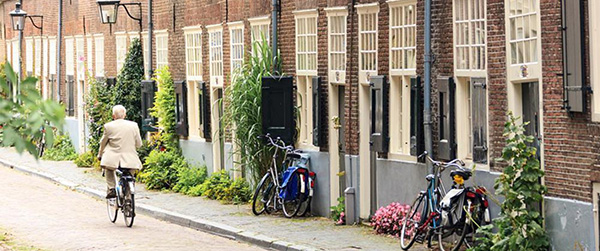
the croft sits comfortably midst a reputedly traffic free area, the series of pathways leading to the surrounding houses offering a safe place for children to play, and allegedly allowing safe access without looking over one shoulder to avoid any free-floating traffic. at each end is a semi-circular area to allow for emergency vehicles, tradesmen and delivery vehicles.
sadly, many years past, one or two residents took to parking their vehicles in these spaces, obstructing their use by said emergency vehicles. this situation came to a head some ten years ago, when an ambulance was unable to turn, due to a parked car. the landowner subsequently issued a directive stating that no vehicles were to be left in those areas on pain of being towed, along with a similar fate due to befall any non-roadworthy vehicles left in the area.
for several years, this directive was actively adhered to; we could perambulate the houses without fear of vehicular interruption, and the children in mrs washingmachinepost's care, were free to ride their bicycles, skateboards, or scooters, as well as indulge in any ball-games that took their little fancies. unfortunately, as is pretty much always the case, that particular good thing came to an end; the turning area is now overpopulated with up to six cars and two vans at any given time. cars come and go at pretty much all times of night and day, and the kids have nowhere to ride their bikes, skateboards and scooters.
despite the nearby car park playing home to five unroadworthy vehicles, occupying useable parking spaces for over a year, oddly enough, the landowner who once corresponded against such a situation, despite not having withdrawn their original objection, seems particularly unfazed by this current parking trend. no further letter has been issued.
it's hard to voice any serious objection, for, in the grand scheme of things, it hardly compares with many of the iniquities i have seen take place in towns and cities across the nation. many of you may well have read the above paragraphs and thought "if only we had it that easy". but it does illustrate that traffic ingress is alive and well and living midst the rural idyll. the car, or rather, the motorist, has every bit as little concern for his/her fellow beings even on the outer edge. i'm sure that, while your indignation might be every bit as great as my own, you and i have both resigned ourselves to the knowledge that it's just the way things are. there's nothing more to be done.
or is there?
despite well-intentioned, accurately researched books, such as carlton reid's 'roads were not built for cars', our towns and cities are still built around the inevitability of the motor car, rather than being designed to better accommodate people. however, that's not to say that the problem is being ignored in every corner of the world.
the netherlands, well-renowned for its 'cyclists - first' mentality is in the process of constructing a car-free residential district, capable of housing up to 12,000 people. sited in utrecht, between two canals, construction of 6,000 homes in the merwede district is expected to be completed by 2024 and serviced by almost 20,000 bicycles.
architect of the project, marco broekman claims that the abiding philosophy is that should be easier to get a bike rather than a car. it will consist not only of dwellings, but two primary schools, a high school, a health centre, as well as shops and businesses. the car-free nature of the design extends to four dead-end roads simply to allow vehicular access to the outer perimeter. underground car parks will take care of 'necessary' vehicles, with spaces existing in the ratio of one car per three households.
regular parking spaces will be prohibitively priced and unassigned to discourage car use, though there will be 300 shared cars for use by those residents for whom walking or cycling simply isn't deemed practical.
"By having this car-free area, we can design spaces without the straightjacket rules of the car."
the inspiration for merwede comes from vauban in germany, where the 5,000 residents must prove once a year that they do not own a car, on pain on having to purchase a space in a multi-storey car park on the town's edge.
hopefully, in their few moments of respite, the occupants of westminster and holyrood might read and digest the salient parts of all the above. i eagerly sit, with breath suitably bated.
the above inspired by a feature in the guardian newspaper, 16 march 2020.
wednesday 18 march 2020
 ..........................................................................................................................................................................................................
..........................................................................................................................................................................................................well, well, well, well
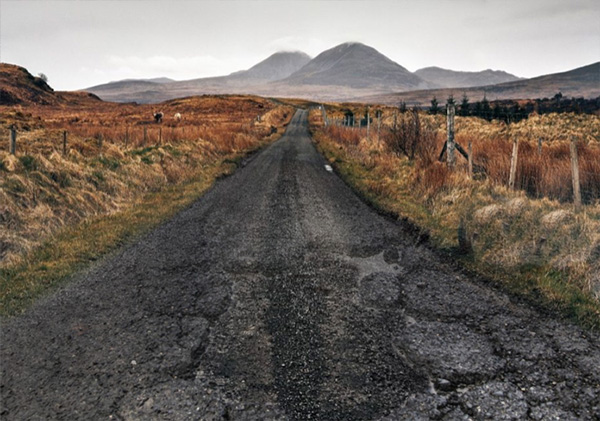
the rather grandiosely titled asphalt industry alliance have estimated that it will cost the uk government around £9.79 billion to repair the nation's potholes. in the light of this revelation, cycling uk has asked the government to offer a long-term strategy that might go someway towards remedying this widespread problem. the timing, like that displayed by any bagpiper, may be less than pristine, given that the government quite likely has more pressing matters with which to deal at present.
however, that scarcely mitigates the potential disruption to road transport, should those existing potholes remain unfilled, to say nothing of those likely to arise in the near future, quite possibly as a result of the existing holes in the ground. according to cycling uk, ninety percent of all councils are failing to fix potholes even in line with their own target times.
of course, those very councils are an easy target, given that the sums of money provided by central government have drastically receded in recent years, to say little of the previous curb on council tax rises. at the risk of, once again, making statements backed with little or no evidence, there's a distinct possibility that road repairs, on islay at least, have scarcely been of a quality that would see them last for any appreciable length of time.
at one time, the gravel used by the local roads department, was supplied from the quarry at ballygrant. however, in a re-appraisal of the standards applicable in such matters, that very gravel was deemed to be below specification, and supplies have now to be imported from the mainland. this, in itself, raises a number of problems; tarmacadam works at its best when used at high temperatures, but with the option to pinpoint on which two-hour ferry journey hot tar might be transported usually unavailable, we have to make use of cold-set tar.
as you may surmise, that brings with it its own problems, probably increased by the apparently common local practice of filling potholes in pouring rain. since the cold-set doesn't fill the hole as efficiently as the hot variety, in more cases than you'd like to think, that repair scarcely lasts more than a few days.
given that members of the velo club peloton tend to travel far and wide along the single track highways and byways, peppered by an apparently ever-increasing number of potholes, we are frequently asked by the motoring fraternity a) how many punctures we get in a year, b) how long those unnaturally narrow tyres survive, and c) don't the potholes cause us endless grief? at the risk of invoking the wrath of the puncture gods, i can confidently state that the number of islay-based punctures are few and far between. as to tyre wear, that's a factor that has definitely increased over the years, but predominantly due to the modern-day practice of surface-dressing, locally referred to as apple crumble.
islay's former roads engineer informed me that the latter means of surfacing the roads, is generally implemented in order to 'seal' the road surface beneath. additionally, there is also a similar road repair method, whereby the existing, disintegrating road, is scraped to its base, before being regurgitated and re-applied to its original location. the end result looks remarkably similar to surface-dressing and has pretty much the same effect on 28mm rubber.
but potholes, in the rural idyll, are far less of a problem to cyclists than you, or the local motorists, might think. along single track roads, which suffer from potholes to a greater extent than the two-lane roadways, traffic can, tautologically, travel only in a single direction at any given time. therefore, as we wend our merry way around the principality, it's really not hard to avoid the potholes. this situation differs drastically from that experienced by mainland urban and city commuters: we're very unlikely to be forced into riding into a large or small pothole by passing traffic.
so, while the above scarcely releases the council from its duty to repair those potholes in a timeous manner, those of us on two wheels are quite probably far better off than our counterparts on four sports utility vehicle wheels. nonetheless, the portents for the country as a whole, and cyclists specifically, are less than promising.
according to cycling uk campaigns manager, keir gallagher "...the reality is that millions of miles of roads in the UK aren't fit for purpose in the first place, and cyclists are being put at risk. The small increase in pothole funding in the budget, from £1.3 billion to £1.5 billion in the next year, will do little to tackle the huge backlog of cases which have built up on local roads across the country."
to once again refer to islay's former roads engineer, when he first took up his post over a decade ago, he estimated it would £22 million to bring the island's roads up to standard. at that time, the roads budget for the whole of argyll and bute (a council with the largest number of islands in scotland, and consequently the largest stretch of coastline), was pegged at £17 million. extrapolate that across the entire country and the gap between westminster's £1.5 billion and the asphalt industry alliance's £9.47 billion, is almost bound to widen exponentially.
the only saving grace is that, with the potential cancellation of this year's paris-roubaix, it should be a simple matter to ride our very own 'cobble-like' sportives along domestic roads.
the title for this article was originally gleaned from an album track by italian prog-rockers, 'premiata forneria marconi' (pfm). the track was entitled 'four holes in the ground'.
tuesday 17 march 2020
 ..........................................................................................................................................................................................................
..........................................................................................................................................................................................................